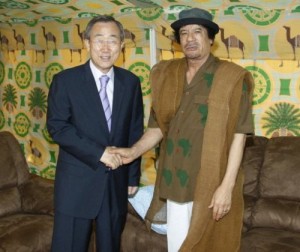 I eagerly await the UN’s enquiry into the violent suppression of the popular demonstrations in Libya.
I eagerly await the UN’s enquiry into the violent suppression of the popular demonstrations in Libya.
According to the latest reports there was what has been characterised as a ‘massacre’ by the BBC in Benghazi. At least 200 protesters have been killed.
But not just killed but executed by snipers with deliberately lethal shots to the head and heart.
As we know, the UN was very keen to demand a rapid enquiry into Israel’s interception of a so-called humanitarian flotilla intent on breaking Israel’s maritime blockade of the Gaza Strip. Nine ‘activists’ were killed, eight of whom were associated with the IHH, an Islamist organisation with close links to Hamas and the Muslim Brotherhood.
In this incident Israeli commandos boarded the lead ship, the Mavi Marmara, where they were subject to a prepared attack by a mob wielding iron bars, knives, and, apparently, at least one firearm. In an act of self-defence the Israelis shot and killed 9 activists at close quarters. Several were reported to have been shot in the head.
The world was up in arms that such ‘unarmed’ humanitarians were ‘attacked’ by Israeli soldiers.
I have already written about this incident and a recent report by the Israeli Turkel commission exonerated the IDF. A Turkish report was also produced which came to a completely opposite conclusion that the deaths were deliberate; an absurdity quite happily accepted by the Muslim world.
Israel faced worldwide condemnation, and pressure was brought to ease the embargo of goods entering Gaza.
Let’s remind ourselves that even if you take the worst view of this incident, Israel killed 9 activists protesting against Israel’s policy in Gaza.
Yet, in Libya, we already have at least 300 casualties, killed for protesting about the policies of their own government, killed deliberately, not in a physical struggle, but at distance by snipers. Killed by their own government for having the audacity to want freedom and democracy.
How much worse is the action of the Libyans in Benghazi and elsewhere than the actions of Israel even interpreted at its worst?
By any system of logic and fairness or consistency the UN must require that Libya immediately investigate these killings. And while they are at it, maybe they can ask the Egyptians to investigate more than 300 deaths or the Bahrainis to investigate the live ammunition used against its citizens, killing several.
The test of a UN that is not biased and is not obsessed with demonising Israel, initiating resolutions and investigations into every state action, would be for there to be equal treatment of the egregious actions of Arab governments.
The UN Human Rights Council has condemned Libya, Bahrain and Yemen, but what actions will they actually take?
In the UK and elsewhere, will academics break of contact with their counterparts in Arab countries whose governments suppress their people with such ruthlessness?
Will Trades Unions vote to divest from these same countries and to cut off co-operation with their fellow unionists?
Those who tell us Israel is not treated differently from other countries and is not held to higher standards, now have their chance to prove it.
UPDATE The speed of events in Libya may well mean that there is nothing left of the Gadaffi regime before too long. (22.00 20 Feb 11)